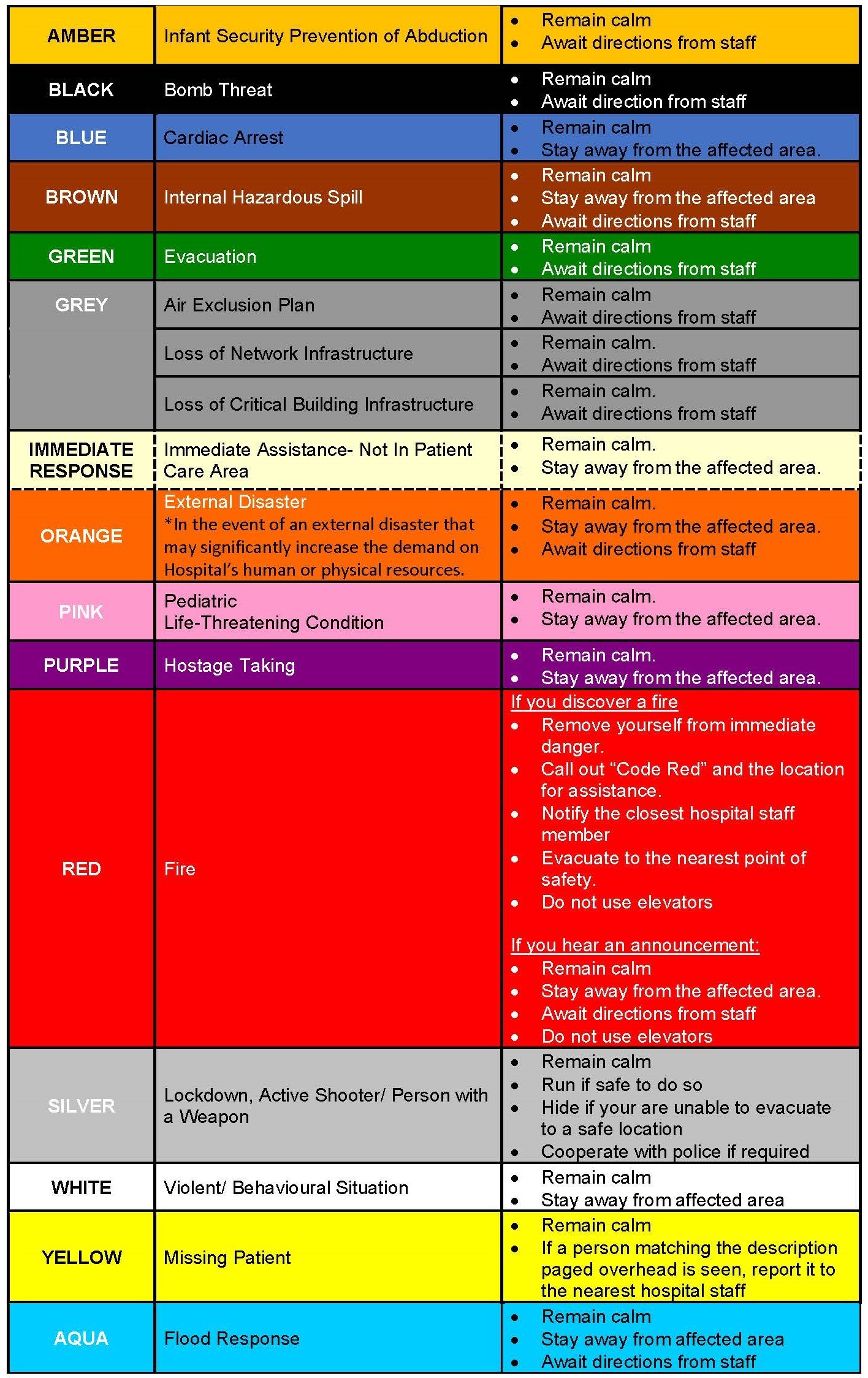
Emergency Preparedness
Emergency preparedness is how we at Brockville General Hospital prepare for emergency and disaster scenarios within our community and our organization. Such measures ensure our patients, visitors, staff, physicians, volunteers, and students are safe during any event and our community is supported as we face these events together.
As an organization, we are taking the necessary steps to establish plans/procedures, community partnerships, system redundancies, and communication methods to ensure we are prepared for any scenario.
In the event of an emergency, your healthcare team will respond accordingly and ensure you are kept informed during the response.
Emergency Codes
Emergency codes are our front-line communication to identify an emergency which requires a coordinated response. Such responses may include pre-established response teams, department specific response procedures, or organizational based responses procedures. Brockville General uses standardized Emergency Codes including a colour coded system which is set by the Ontario Hospital Association.
If you note an emergency notify a Brockville General staff member, physician, or volunteer immediately so they may take the appropriate steps to respond.
Emergency Preparedness: Home Readiness
Emergencies can happen at any time, and it’s crucial to be prepared—both at the hospital and at home. Whether dealing with a natural disaster, a medical crisis, or a power outage, being ready is essential to safeguarding yourself and your loved ones. Here are some suggestions on how you as community members can stay prepared at home.
While hospitals play a crucial role in managing emergencies, it’s just as important for the community to be prepared at home. Taking simple steps can help ensure that you and your loved ones stay safe during any emergency. Here are practical tips for emergency preparedness at home:
Know the risk
Throughout Ontario hazards can be found in varying degrees. Knowing which hazards pose a risk to you in your community is crucial when planning to prepare yourself at home. Utilize some of the following links to see what hazards are found in your region.
- Hazards monitored by Emergency Management Ontario
- Historical list of Canadian disasters – Public Safety Canada Disaster Database
- Public Safety Canada Safety risk resource guides - GetPrepared.ca.
Make a plan
Develop a 72-hour preparedness plan by visiting The Government of Canada – Get Prepared webpage. Ensure to consider special accommodations for those with disabilities, or special medical needs as their needs may differ dependent on the emergency. Don’t forget about your furry friends, animals should always be included as part of your emergency planning.
Build an Emergency Kit
Develop an emergency kit to support your 72-hour preparedness plan. The Government of Canada – Get Prepared webpage can support you in determine what essential items should be included in your kits.
Stay Informed
During emergencies, it’s important to stay informed through reliable sources such as:
- Local news outlets
- Emergency services and alerts
- Hospital updates and availability via our website and social media channels.
- Ontario 511
- Environment Canada – WeatherCAN
- Ontario Ministry of the Environment, Conservation and Parks – Air Quality
Sign up for local emergency alerts or download apps that provide real-time information during disasters.
While hospitals play a critical role in responding to emergencies, communities that are prepared at home provide an additional layer of resilience. When families and individuals take steps to prepare for emergencies, they can help alleviate the pressure on hospitals and emergency services during crises.
Stay prepared, stay safe.
Contact Us
Brockville General Hospital
75 Charles St., Brockville, ON K6V 1S8
Phone: 613-345-5649
Fax: 613-345-3529
Sign up to our releases
Stay up to date on our hospital's activities, events, programs and operations by subscribing to our releases.
